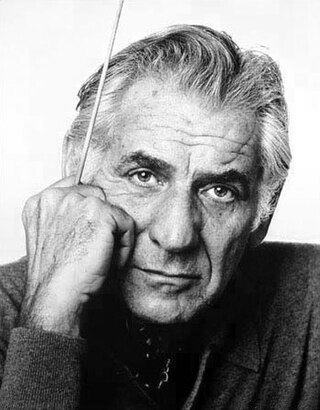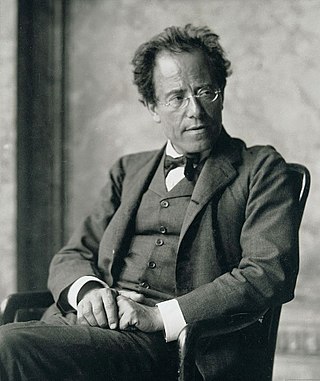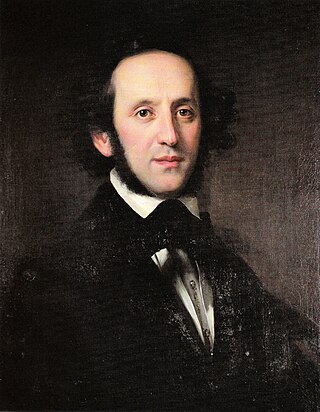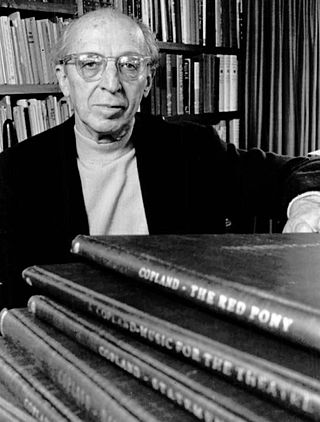Related Research Articles

Leonard Bernstein was an American conductor, composer, pianist, music educator, author, and humanitarian. Considered to be one of the most important conductors of his time, he was the first American conductor to receive international acclaim. According to music critic Donal Henahan, he was "one of the most prodigiously talented and successful musicians in American history". Bernstein was the recipient of many honors, including seven Emmy Awards, two Tony Awards, sixteen Grammy Awards including the Lifetime Achievement Award, and the Kennedy Center Honor.

The Symphony No. 6 in A minor by Gustav Mahler is a symphony in four movements, composed in 1903 and 1904, with revisions from 1906. It is sometimes nicknamed the Tragic ("Tragische"), though the origin of the name is unclear.

The Symphony No. 9 by Gustav Mahler was written between 1908 and 1909, and was the last symphony that he completed. A typical performance takes about 75 to 90 minutes. A survey of conductors voted Mahler's Symphony No. 9 the fourth greatest symphony of all time in a ballot conducted by BBC Music Magazine in 2016. As in the case of his earlier Das Lied von der Erde, Mahler did not live to see his Symphony No. 9 performed.

The Piano Concerto No. 1 in D minor, Op. 15, is a work for piano and orchestra completed by Johannes Brahms in 1858. The composer gave the work's public debut in Hanover, the following year. It was his first-performed orchestral work, and his first orchestral work performed to audience approval.

Hans Werner Henze was a German composer. His large oeuvre of works is extremely varied in style, having been influenced by serialism, atonality, Stravinsky, Italian music, Arabic music and jazz, as well as traditional schools of German composition. In particular, his stage works reflect "his consistent cultivation of music for the theatre throughout his life".

Felix Mendelssohn's Violin Concerto in E minor, Op. 64, is his last concerto. Well received at its premiere, it has remained among the most prominent and highly-regarded violin concertos. It holds a central place in the violin repertoire and has developed a reputation as an essential concerto for all aspiring concert violinists to master, and usually one of the first Romantic era concertos they learn. A typical performance lasts just under half an hour.

The Piano Concerto No. 1 in B♭ minor, Op. 23, was composed by Pyotr Ilyich Tchaikovsky between November 1874 and February 1875. It was revised in 1879 and in 1888. It was first performed on October 25, 1875, in Boston by Hans von Bülow after Tchaikovsky's desired pianist, Nikolai Rubinstein, criticised the piece. Rubinstein later withdrew his criticism and became a fervent champion of the work. It is one of the most popular of Tchaikovsky's compositions and among the best known of all piano concerti.
The Cello Concerto in B minor, Op. 104, B. 191, is the last solo concerto by Antonín Dvořák. It was written in 1894 for his friend, the cellist Hanuš Wihan, but was premiered in London on March 19, 1896, by the English cellist Leo Stern.

Connotations is a classical music composition for symphony orchestra written by American composer Aaron Copland. Commissioned by Leonard Bernstein in 1962 to commemorate the opening of Philharmonic Hall in New York City, United States, this piece marks a departure from Copland's populist period, which began with El Salón México in 1936 and includes the works he is most famous for such as Appalachian Spring, Lincoln Portrait and Rodeo. It represents a return to a more dissonant style of composition in which Copland wrote from the end of his studies with French pedagogue Nadia Boulanger and return from Europe in 1924 until the Great Depression. It was also Copland's first dodecaphonic work for orchestra, a style he had disparaged until he heard the music of French composer Pierre Boulez and adapted the method for himself in his Piano Quartet of 1950. While the composer had produced other orchestral works contemporary to Connotations, it was his first purely symphonic work since his Third Symphony, written in 1947.

Symphony No. 3 "Kaddish" is a programmatic choral symphony by Leonard Bernstein, published in 1963. It is a dramatic work written for a large orchestra, a full choir, a boys' choir, a soprano soloist and a narrator. "Kaddish" refers to the Jewish prayer that is chanted at every synagogue service for the dead but never mentions "death."

The Bassarids is an opera in one act and an intermezzo, with music by Hans Werner Henze to an English libretto by W. H. Auden and Chester Kallman, after Euripides's The Bacchae.
Hans Werner Henze's Symphony No. 1 was premiered in Darmstadt in 1947. The premiere was hit by Henze’s accustomed bad luck. The orchestral parts, handwritten by the composer himself, had become illegible during photocopying in Schott’s offices and despite the young composer’s best efforts to ink in the parts throughout the night, only the slow movement was performed. The whole symphony was eventually premiered a year later, although Henze himself conducted the work only after comprehensive revision.
Yakov Kreizberg was a Russian-born American conductor.

Ingo Metzmacher is a German conductor and artistic director of the festival KunstFestSpiele Herrenhausen in Hanover.
The Concert Fantasia in G, Op. 56, for piano and orchestra, was written by Pyotr Ilyich Tchaikovsky between June and October 1884. It was premiered in Moscow on 6 March [O.S. 22 February] 1885, with Sergei Taneyev as soloist and Max Erdmannsdörfer conducting. The Concert Fantasia received many performances in the first 20 years of its existence. It then disappeared from the repertoire and lay virtually unperformed for many years, but underwent a revival in the latter part of the 20th century.
Symphony No. 6 for two chamber orchestras by Hans Werner Henze was written in 1969.
The Seventh Symphony by the German composer Hans Werner Henze was written in 1983-84. It was commissioned by the Berliner Philharmoniker as part of the orchestra's centenary celebrations in 1982.
Woldemar Nelsson was a Russian conductor who was active in West Germany and numerous other countries from 1976 onwards.
Hans Werner Henze's Symphony No. 4 was written in 1955. It was premiered at the Hochschule für Musik, Berlin on 9 October 1963 by the Berlin Philharmonic Orchestra conducted by the composer.

Divertimento, or Divertimento for Orchestra, is a suite of eight orchestral bagatelles by American composer Leonard Bernstein. Completed in 1980 and written to celebrate the centenary of the Boston Symphony Orchestra, it is well-known for featuring the notes B and C in most of its melodic material.